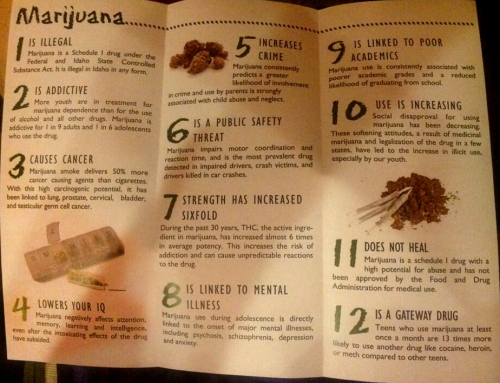There is a ton of nonsense floating around the media recently (a lot of it has been noted in comments here). Some of it is no doubt linked to blowback due to recent gains made by legalizers. But these dinosaurs are having a harder time finding new audiences for their nonsense. Sure, there are a few fossils who agree with them, but they’re becoming extinct.
 Is There a Marathon-Marijuana Connection? by Steve Adelman, director of Physician Health Services, Inc., a corporation of the Massachusetts Medical Society.
Is There a Marathon-Marijuana Connection? by Steve Adelman, director of Physician Health Services, Inc., a corporation of the Massachusetts Medical Society.
This idiot is writing for a Medical Society Blog, no less, and yet can do nothing but wild conjecture in five different directions, all of which implicate marijuana, of course.
Numerous acquaintances of Dzhokhar describe the suspected bomber as something of a “stoner.†If he was getting high on a daily or near-daily basis, then he most certainly had THC in his brain at the time of the bombing.
On the other hand, when a chronic marijuana abuser decides to go clean, it can take 6 to 12 weeks for the THC to leave his system. As THC levels drop, chronic users can become anxious and irritable. Perhaps low-grade withdrawal symptoms played a role in irrational decision making.
But if chronic or intermittent pot-smoking remained in the picture until Patriots Day, then perhaps this most profoundly misguided of decisions was influenced by the suspect’s being under the influence. Heavy marijuana users shed IQ points, and don’t think as clearly as they did before they started bathing their brains in THC, which is there around-the-clock because of its ultra-long half-life.
Much of the reporting indicates that Dzhokhar functioned at a higher level in high school than he did in college. If so, marijuana may have played a role in “dumbing him down.†His academics may have suffered, and, in the words of his own uncle, he became, “a loser.†It isn’t easy to tolerate going from being a winner to being a loser. A pot-addled loser, with parents half a world away, might be particularly at risk for coming under the influence of a simplistic, radical ideology, foisted upon him by a domineering older brother.
[Thanks, Michael]
 Britain’s marijuana mafia: Two million users, £6bn worth of trade and 30,000 deaths. A leading author meets the men (and women) feeding the UK’s terrifying addiction
Britain’s marijuana mafia: Two million users, £6bn worth of trade and 30,000 deaths. A leading author meets the men (and women) feeding the UK’s terrifying addiction
This is Daily Mail at its most outrageous (which is saying something). Of course, most of the problems they talked about were actually problems due to prohibition. But, are you curious about those 30,000 deaths? I was.
Here’s how they come up with it:
Cannabis is far from ‘safe’ despite its reputation. […]
It is also carcinogenic. The British Lung Foundation says smoking three joints a day causes similar damage to smoking 20 cigarettes a day. That would suggest that up to 30,000 people a year contract cannabis-related cancer.
Well, they’re off by about… 30,000.
Just in case you needed more proof than already exists that marijuana smoking does not increase your risks of lung cancer, here’s another study at the Oncology Report that looks at all the other studies, and finds…
Marijuana habit not linked to lung cancer
Regular cannabis smokers are no more likely to develop lung cancer than are people who indulge occasionally.
The finding of no significant increased risk held true whether the smokers imbibed once or twice – or more – each day, and regardless of how many years they had smoked, Dr. Li Rita Zhang reported at the annual meeting of the American Association of Cancer Research.
The study included data from six case-control studies conducted from 1999 to 2012 in the United States, Canada, the United Kingdom, and New Zealand, with a subject pool of 2,159 lung cancer cases and 2,985 controls. All of the studies were part of the International Lung Cancer Consortium (ILCCO), an international group of lung cancer researchers with the aim of sharing comparable data from ongoing and recently completed lung cancer studies from different geographical areas and ethnicities.
No surprise here, but it seems to still be news that some folks just refuse to absorb.



